Woody Guthrie's (1912–67) 100th birthday, the godfather of topical singer-songwriters, spawned celebration galore - and a few books as well.
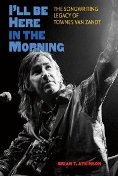 The word ‘poet’ keeps coming to mind. I mean a real poet. When people discover Townes, they’re just enlightened. They’re instant fans. If it were a perfect world, Townes would be as well known as Bob Dylan. (R.W. Hubbard)
Townes Van Zandt
[34],
his generation’s most influential songwriter though virtually unknown to the general public,
lived fast and died much too young.
He left behind classic songs such as "Pancho and Lefty", "Tecumseh Valley", "Waitin' Round to Die",
and I’ll Be Here in the Morning spotlights his impact and influence, the publication
coinciding with the 15th anniversary of his death.
Brian Atkinson did
more than 40 interviews with veteran artists such as Guy Clark [47],
Kris Kristofferson [17],
and John Gorka [43],
and younger singer-songwriters such as
Josh Ritter [44]
and Kasey Chambers [46]
who both examine the extraordinary lyrics
and share anecdotes and stories about Van Zandt's life and career.
The word ‘poet’ keeps coming to mind. I mean a real poet. When people discover Townes, they’re just enlightened. They’re instant fans. If it were a perfect world, Townes would be as well known as Bob Dylan. (R.W. Hubbard)
Townes Van Zandt
[34],
his generation’s most influential songwriter though virtually unknown to the general public,
lived fast and died much too young.
He left behind classic songs such as "Pancho and Lefty", "Tecumseh Valley", "Waitin' Round to Die",
and I’ll Be Here in the Morning spotlights his impact and influence, the publication
coinciding with the 15th anniversary of his death.
Brian Atkinson did
more than 40 interviews with veteran artists such as Guy Clark [47],
Kris Kristofferson [17],
and John Gorka [43],
and younger singer-songwriters such as
Josh Ritter [44]
and Kasey Chambers [46]
who both examine the extraordinary lyrics
and share anecdotes and stories about Van Zandt's life and career.
Brian T. Atkinson, I’ll Be Here in the Morning - The Songwriting Legacy of Townes Van Zandt.
Texas A&M University Press,
2011, ISBN 978-1-60344-526-9 , pp272, US-$24.95 (www.towneslegacy.com).
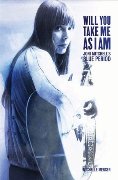 In the late 60s Joni Mitchell
[41]
had made a name for herself as a folk singer. Then she went abroad, fled to a hippie commune
and underwent intense soul searching. In 1971, she recorded the confessional and
painful album "Blue" (1971), an almost perfect marriage of lyric, melody, mood,
and explored experience, which marked the beginning of a creative era.
This so-called Blue Period (1971-1976) has been
explored by Michelle Mercer,
who spent considerable time talking to the media-shy Joni Mitchell.
It is part biography, memoir and report - Mitchell's Canadian childhood and her internal
and external struggles -, part critique, study and analysis of Mitchell's craft -
how she pioneered autobiographical songwriting and married lyrics to melody,
how landscape affects music, how songs and poetry differ, ...
In the late 60s Joni Mitchell
[41]
had made a name for herself as a folk singer. Then she went abroad, fled to a hippie commune
and underwent intense soul searching. In 1971, she recorded the confessional and
painful album "Blue" (1971), an almost perfect marriage of lyric, melody, mood,
and explored experience, which marked the beginning of a creative era.
This so-called Blue Period (1971-1976) has been
explored by Michelle Mercer,
who spent considerable time talking to the media-shy Joni Mitchell.
It is part biography, memoir and report - Mitchell's Canadian childhood and her internal
and external struggles -, part critique, study and analysis of Mitchell's craft -
how she pioneered autobiographical songwriting and married lyrics to melody,
how landscape affects music, how songs and poetry differ, ...
Michelle Mercer, Will You Take Me As I Am - Joni Mitchell's Blue Period.
Backbeat Books HL 00333266,
2012, ISBN 9781617130281, pp242, US-$19.99.
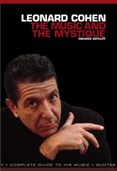 Though Leonard Cohen
[46]
did influence Joni Mitchell's music and her thinking, she came to regard him as somewhat superficial: He cannot write a song without putting the phrase 'naked body' into it.
The Music and the Mystique is a guide to Cohen's music, including an album by album, track by track analysis of every song he ever recorded: from his earliest studio recording
"Songs of Leonard Cohen" (1967) - introducing Cohen's principal theme love, loss and loneliness
and featuring his classic song "Suzanne," that announced the arrival of an original and distinctive voice -
to his most recent album "Old Ideas" (2012) which once again met critical acclaim and commercial success.
Covering 12 studio albums, plus live albums (e.g. discussing the lyrical variations and the
evolution of "Hallelujah"), best of compilations, singles and tribute albums, Ratcliffe
comments on the background of all songs, lyrics, vocal delivery, arrangement and performance.
It is intended to illuminate, to distinguish the major from the minor, and to point out obscure and interesting details.
Though Leonard Cohen
[46]
did influence Joni Mitchell's music and her thinking, she came to regard him as somewhat superficial: He cannot write a song without putting the phrase 'naked body' into it.
The Music and the Mystique is a guide to Cohen's music, including an album by album, track by track analysis of every song he ever recorded: from his earliest studio recording
"Songs of Leonard Cohen" (1967) - introducing Cohen's principal theme love, loss and loneliness
and featuring his classic song "Suzanne," that announced the arrival of an original and distinctive voice -
to his most recent album "Old Ideas" (2012) which once again met critical acclaim and commercial success.
Covering 12 studio albums, plus live albums (e.g. discussing the lyrical variations and the
evolution of "Hallelujah"), best of compilations, singles and tribute albums, Ratcliffe
comments on the background of all songs, lyrics, vocal delivery, arrangement and performance.
It is intended to illuminate, to distinguish the major from the minor, and to point out obscure and interesting details.
Maurice Ratcliffe, Leonard Cohen - The Music and the Mystique.
Omnibus,
2012, ISBN 978-1-78038-302-6, pp96, £8.95.
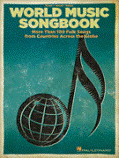 The World Music Songbook features more than 100 folk favourites from Cape Breton to Cape Hope,
from the "Blue Bells of Scotland" to the Australian "Ballad of Ned Kelly,"
including all time favourites such as "Kumbayah" from the Congo, "Guantanamera" from Cuba and the
Mexican "La Cucaracha," not to mention the French and Irish songs.
However, there is material beyond the usual suspects, e.g. the
particular version of "Three Ravens" - the birds who devour a slain knight are better known
as the Scots "Twa Corbies" -
set to the tune of "Derry Down Down", which in turn is no. 26 in the Child collection.
The World Music Songbook features more than 100 folk favourites from Cape Breton to Cape Hope,
from the "Blue Bells of Scotland" to the Australian "Ballad of Ned Kelly,"
including all time favourites such as "Kumbayah" from the Congo, "Guantanamera" from Cuba and the
Mexican "La Cucaracha," not to mention the French and Irish songs.
However, there is material beyond the usual suspects, e.g. the
particular version of "Three Ravens" - the birds who devour a slain knight are better known
as the Scots "Twa Corbies" -
set to the tune of "Derry Down Down", which in turn is no. 26 in the Child collection.
World Music Songbook - More Than 100 Folk Songs from Countries Across the Globe.
Hal Leonard HL 00311411,
2011, ISBN 978-1-4234-2580-9, pp248, US-$19.99.
Bring me, said David, the harp I adore, I long, ere death calls me, to play it once more ...
"Dafydd y Garreg Wen" (David of the White Rock)
is a haunting air composed by Welsh harper David Owen
from Porthmadog, Caernarfonshire, on his death bed
requesting that it might be performed at his funeral
(White Rock being the name of his farm).
The tune was first published in 1794 and subsequently Welsh and
various English lyrics were put to it.
Here is sheet music arranged for mixed voices (soprano, alto, tenor and bass) and piano
by York choral conductor Tim Knight.
Tim Knight, David of the White Rock - Traditional Welsh Tune arranged for SATB Choir and Piano.
Tim Knight Music/Spartan Press TKM339,
2012, ISMN 979-0-708106-48-7, pp8, £2.45.
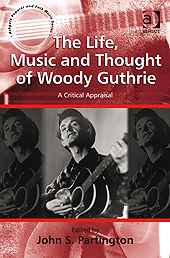
In 1941, Woody Guthrie was employed as information consultant by the Bonneville Power Administration and wrote a cycle of about 26 songs which documented the Columbia River Project (e.g. "Pastures of Plenty"). The songwriter focused on the problems which migratory workers from the Dust Bowl region had to face in California, he tried to raise the people's spirits and also praised the government for its endeavours to create jobs through the construction of dams in the Pacific Northwest.
Sounds quaint these days to read a line such as this: America's future was to be defined in terms of social security rather than in terms of open spaces.
Richard Nate's article is the first essay of The Life, Music and Thought of Woody Guthrie in the Ashgate Popular and Folk Music Series.[36][46] Philologists, historians, journalists and ethnologists concentrate on the phenomenon Woody Guthrie, his music as well as his prose and his continuing influence on popular culture.
This is thrilling and illuminative, sometimes surprising. Legends and myths are questioned and new insight uncovered.
Woody Guthrie is represented as America's pioneering modern folk singer, who became the recording machine for other peoples worries, blues, mix-ups and fights and transformed American folk music into an urban phenomenon.
Moreover, the guy who wrote "This Land Is Your Land" is represented as a political character with two contrasting social visions: a conservative one espousing the virtues of independent small-hold farming and the traditional family and a radical one espousing politicized labour unions, large-scale government projects, anti-racism, women's rights and internationalism.
On the other hand, the collection looks behind the public image of Guthrie as Dust Bowl balladeer and chronicler of the Okie experience. In so far, as songs about the Dust Bowl and the migrant experience all but disappeared from his live repertoire after 1940, and as apolitical songs appeared in similar or greater numbers than topical songs throughout much of his career.
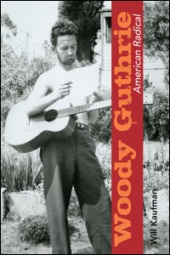
There are essays on Woody's fictonal working class hero Jackhammer John and the figure of the hobo, which has become central to American folk culture, in Woody's songs and writings, as well as his relationship to and friendship with folk song collector Alan Lomax[23] (responsible for the Dust Bowl Ballads recordings, Woody's autobiographical novel "Bound for Glory" and the Bonneville job and its song cycle), actor Will Geer (Grandpa Walton) and Guthrie-ite protest singer Bob Dylan.[45]
Will Kaufman, brother to flatpicker Steve Kaufman,[46] views Woody Guthrie as part of a broader cultural movement, the so-called Cultural Front, the extraordinary flowering of arts, entertainment and thought associated with the American Left. He concludes that it was Woody's encounter with fellow songwriter Pete Seeger[39] not being th' Dustiest of th' Dust Bowlers that would ensure his wholesale transformation into a balladeer for the Congress of Industrial Organizations.
Today Woody Guthrie - who said himself I was born to be a reddical and the life and death of a reddical is the only kind of a life and a death I'd sign up with - had become America's national treasure, his radical profile almost wiped out. Indeed it is hard to believe these days that there had been a radical tradition in America altogether.

But yes, there was such a thing before McCarthyism and the Cold War. Kaufman's own book Woody Guthrie, American Radical investigates Woody Guthrie's magnum opus as the work of a dedicated agitator going along with and shaping the Great Depression, the worker's and union movement, New Deal, the Communist Party of the USA and the Popular Front, World War II and the Civil Rights struggle.
Kaufman paints a convincing picture and puts away the fiction of a censored Woody Guthrie. "This Land Is Your Land" (with all verses) is a radical and no American hymn. Furthermore,
Woody Guthrie turned from his prewar pacifism to an anti-Fascist fightin' sonofagun, writing violent war songs, and back to a soul-searching anti-war activist after dropping the atomic bombs on Hiroshima and Nagasaki. (Besides being torpedoed twice, the only violence Guthrie encountered in the US Merchant Marine was getting a punch in the nose from a shipmate for shouting God bless the Red Army!)
It also had been a hot dusty road from his casual, thoughtless racism of his youth to greater wisdom and racial empathy. Kaufman makes Guthrie less of a saint, and more of a committed, flawed human being immersed in political complexity and a harrowing personal struggle.
Still, Will Kaufman is an admirer of Woody's art and continues to sing his songs which were written of and for all the hard-hit and the hard travelling people ...
Photo Credits:
(1ff) Book Covers,
Townes van Zandt,
Woody Guthrie
(from website/author/publishers).